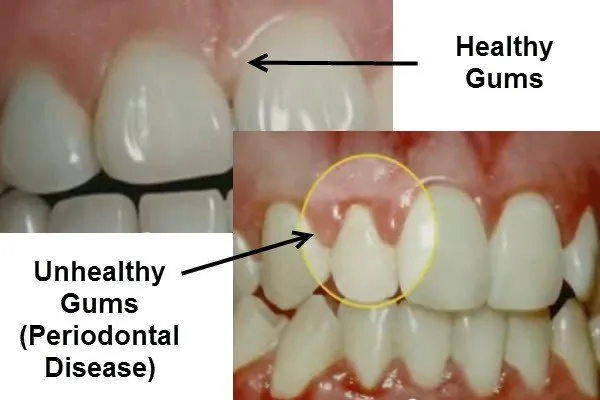Gum disease is a very common condition where the gums become swollen, sore or infected and most people experience it at least once. It is much less common in children. As per Canadian Dental Association (CDA), 7 out of 10 Canadians develop gum disease at some time in their lives. The incidence of gum disease is very high. It is seen in all types of people, all races and cultures, regardless of where they live or their level of education
People who do not go to a family dentist are frequently unaware they have a problem — an estimated 20 per cent of Canadians have active periodontal disease and do not know it.
Gum disease, also known as periodontal disease, is a chronic infection that can result in a number of health problems, from mild inflammation to severe gum damage to tooth loss, if left untreated. In addition, gum disease can affect your overall health, and has been linked to an increased risk of heart disease and stroke.
It is an infection of the tissues that surround and support your teeth, and is caused by plaque, the sticky film of bacteria that is constantly forming on our teeth. Plaque that is not removed with thorough daily brushing and cleaning between teeth can eventually harden into calculus or tartar.
If you have gum disease, your gums may bleed when you brush your teeth and you may have bad breath. This stage of gum disease is known as gingivitis. If gingivitis is not treated, a condition called periodontitis can develop. This affects the tissues that support teeth and hold them in place.
Signs of Gum Disease:
Your oral health is critical to your overall health. If you notice any of the following symptoms, seek care from a dentist who is knowledgeable about treating gum disease:
-
A sour taste in your mouth or persistently bad breath
-
A change in how your partial dentures fit
-
A change in how your teeth fit together when you bite down
-
Bleeding gums
-
Gum tissue that pulls away from your teeth
-
Loose teeth or increasing spaces between your teeth
-
Pain when chewing
-
Unusually sensitive teeth
-
Swollen and tender gums
Gum Disease Treatment Options:
-
Regular professional deep cleanings
-
Medications that are either taken orally or are inserted directly into infected tissue pockets
-
Surgery, in more severe cases of gum disease.
-
Good oral hygiene home practices i.e. brushing + flossing.
Despite following good oral hygiene practices, people may be genetically susceptible to gum disease. If anyone in your family has gum disease, it may mean that you are at greater risk, as well. If you are more susceptible to gum disease, your dentist or periodontist may recommend more frequent check-ups, cleanings, and treatments to better manage the condition.
Source: www.canada.com/health/disease rise population ages/1353520/story.html

